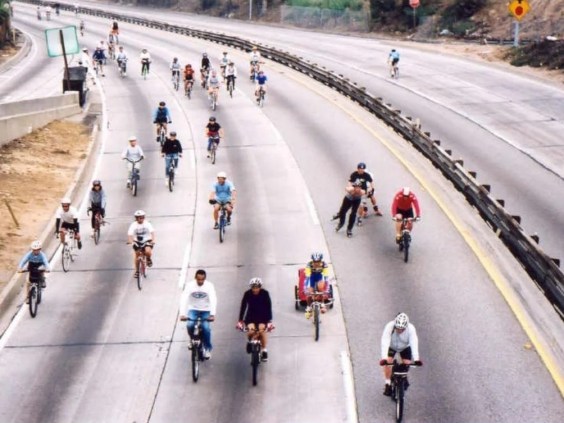Jared Sanchez is the policy director of Calbike.
In California, our transportation sector contributes more than any other sector to climate pollution. The Climate Action Plan for Transportation Infrastructure (CAPTI) lays out a limited set of plans and goals for reducing emissions from transportation. However, it’s not enough. And climate change isn’t a problem we can push off into a hazy future; it’s here now.
We need to spend more, not less, on active transportation, and although California will need to make some hard choices due to the budget shortfall this year, there is no deficit in the transportation budget.
“California is falling behind and we need to put our money where our climate policies are,” says Jared Sanchez, policy director for CalBike. “CalBike’s People-First Mobility Budget prioritizes projects that mitigate climate change, increase equity, and expand transportation choices. If we build safe, connected, Complete Streets networks, Californians can choose their transportation mode instead of being forced into a car.”
To address this lack of choice, today CalBike has launched a new campaign: the People-First Mobility Budget.
The People-First Mobility Budget for 2024-2025
The People-First Mobility Budget, which includes $20 billion in state funding and $9 billion from federal transportation funding, proposes distributing those funds as follows:
- 50% of the State Highway Account (SHA) to active transportation projects, and other VMT-reducing projects.
- $700 million to the Active Transportation Program (ATP).
- A $2 billion set aside for the construction of truly Complete Streets. 25% of the Federal Trust Fund to VMT-reducing projects, including but not limited to implementing transit priority corridors on state/federal highways.
- 75% of combined federal and state monies would continue to prioritize repair and maintenance of state-controlled roads. This fix-it-first allocation of approximately $15 billion will pay for needed repairs such as fixing potholes, hardening infrastructure against extreme weather, and scheduled repaving. No repair projects should include new lanes, interchanges, or other infrastructure that would increase vehicle miles traveled (VMT).
- At least half of the above spending should go toward improving infrastructure in historically underserved areas.
- Zero funding for increased highway capacity. No new freeway lanes, overpasses, or interchanges.
Benefits of a people-first approach to mobility
A people-centered approach to transportation priorities doesn’t force anyone out of their car, but it gives Californians choices about how they get around their communities. Here are just a few of the benefits.
- Greater independence for youth and seniors.
- Healthier neighborhoods.
- Financial savings. AAA calculates the average annual cost of car ownership at $9,282. For someone making $50,000 a year, that’s 20% of their income going to transportation. Taking public transit is cheaper. And walking is free.
- Improved physical and mental health. Commuting or running errands by bike is a great way to incorporate physical movement into a daily routine. And regular exercise improves mental health as well.
- Less congestion. Two of the top 10 most congested cities in the US are in California: Los Angeles and San Francisco. According to US News and World Report, that congestion comes with a financial cost of around $1,600 per driver each year, not to mention lost time and frustration.






